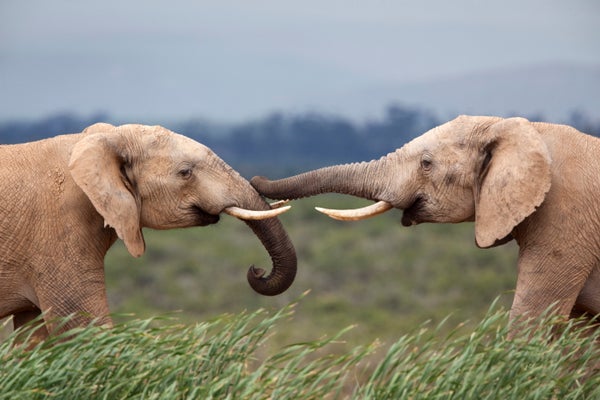On supporting science journalism
If you're enjoying this article, consider supporting our award-winning journalism by subscribing. By purchasing a subscription you are helping to ensure the future of impactful stories about the discoveries and ideas shaping our world today.
Elephants do not have the greatest eyesight in the animal kingdom, but they never forget a face. Carol Buckley at The Elephant Sanctuary in Hohenwald, Tenn., for instance, reports that in 1999 resident elephant Jenny became anxious and could hardly be contained when introduced to newcomer Shirley, an Asian elephant.
As the animals checked one another out with their trunks, Shirley, too, became animated and the two seemingly old friends had what appeared to be an emotional reunion. "There was this euphoria," sanctuary founder Buckley says. "Shirley started bellowing, and then Jenny did, too. Both trunks were checking out each other's scars. I've never experienced anything that intense without it being aggression."
Turns out the two elephants had briefly crossed paths years earlier. Buckley knew that Jenny had performed with the traveling Carson & Barnes Circus, before coming to the sanctuary in 1999, but she knew little about Shirley's background. She did a little digging, only to discover that Shirley had been in the circus with Jenny for a few months—23 years earlier.
Remarkable recall power, researchers believe, is a big part of how elephants survive. Matriarch elephants, in particular, hold a store of social knowledge that their families can scarcely do without, according to research conducted on elephants at Amboseli National Park in Kenya.
Researchers from the University of Sussex in England discovered that elephant groups with a 55-year-old matriarch (elephants live around 50 to 60 years) were more likely to huddle in a defensive posture than those with a matriarch aged 35 when confronted by an unfamiliar elephant. The reason: they were aware such strangers were likely to start conflicts with the group and possibly harm calves, Karen McComb, a psychologist and animal behaviorist at Sussex, and her colleagues reported in Science.
Other researchers, who studied three herds of elephants during a severe 1993 drought at Tanzania's Tarangire National Park, found that they not only recognize one another but also recall routes to alternate food and water sources when their usual areas dry up.
The scientists from the Wildlife Conservation Society (WCS) in New York City reported in Biology Letters that pachyderm groups with matriarchs, ages 38 and 45, left the parched park, apparently in search of water and grub, but the ones with a younger matriarch, age 33, stayed put.
Sixteen of 81 calves born in the park that year died in a nine-month period, a 20 percent mortality rate, much higher than the typical 2 percent; 10 of the dead were from the group that remained in the park, where feed and water were scarce.
Researchers concluded that the older elephants recalled a drought in the park that lasted from 1958 to 1961, and how their packs survived the slim pickings by migrating to lusher areas a distance away. None of the elephants that stayed behind were old enough to remember the previous dry spell.
Elephants also apparently recognize and can keep track of the locations of as many as 30 companions at a time, psychologist Richard Byrne of the University of Saint Andrews in Scotland and other researchers discovered during a 2007 study at Amboseli.
"Imagine taking your family to a crowded department store and the Christmas sales are on," Byrne says. "What a job to keep track of where four or five family members are. These elephants are doing it with 30 traveling-mates."
The scientists tested this memory by placing urine samples in front of female elephants, who thoroughly checked them with their trunks and acted up when they came across one that did not come from a member of their brood, and thereby should not have been there. "Most animals that hang around in packs, such as deer, probably have no idea who the other animals in their pack are," Byrne says. But elephants "almost certainly know every [member] in their group."
Such "working memory" is "far in advance of anything other animals have been shown to have," Byrne adds, and helps the elephant monitor the family units that move, forage and socialize together.
When it comes to smarts, elephants are right up there with dolphins, apes and humans, says WCS cognitive scientist Diana Reiss and colleagues at Emory University in Atlanta. They reported in 2006 in the Proceedings of the National Academy of Sciences USA that elephants, like the other mammals in that exclusive circle, are the only animals known to recognize their reflections in a mirror.
Zoologist Iain Douglas-Hamilton, founder of Save the Elephants in Nairobi, Kenya, is an authority on pachyderms who has studied them since the 1960s. He recounts becoming so well acquainted with an elephant in Tanzania's Lake Manyara National Park early in his career that he could actually walk beside her in the wild. He left the area in 1969 to write his thesis and did not return again for four years. But when he came back, he says, it was as though he'd never left. "She came right back up to me and behaved the same way," he says, noting that they resumed their friendly strolls.
"They're long-lived animals, and memory would be a benefit to a long-lived animal, making it more adaptive to circumstances," Douglas-Hamilton says. "Clearly if elephants experience extremes of climate and they can remember where the food is during a year, they can survive."
So the next time someone says you have a memory like an elephant, take it as a compliment.
